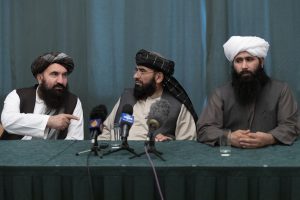The United States under the new administration of President Joe Biden announced it would withdraw fully from Afghanistan by September, a withdrawal implied to be tied to an agreement made with the Taliban in February 2020. Yet, the Taliban have made it clear that they consider the new timeline a violation of the agreement, which envisioned the United States out of Afghanistan by May 1.
The agreement had secured a limited ceasefire, though only between the U.S. and the Taliban, and a pledge that the Taliban would prevent other groups from using Afghan soil against U.S. interests. That particular clause linked the agreement to the United States’ original mission in Afghanistan, to defeat al-Qaida. But despite the Obama administration’s attempts to portray the assassination of al-Qaida leader Osama bin Laden as the defeat of the organization, it was soon evident that the movement had merely transformed. It continued to serve as an umbrella organization capitalizing on the fluid nature of the jihadi groups of the wider region and forming alliances with them.
Much has been written on the improbability of the Taliban cutting ties with al-Qaida due to inter-marriages between the groups and close political alignment, which can be seen in the lack of a public renouncement of al-Qaida by the Taliban.
A missing piece of analysis, however, is studying a scenario where the Taliban are genuine in their assurances to cut ties with al-Qaida. Do they even have the capacity to deliver on such a pledge?
The Taliban was hardly competent at governance during its reign from 1996 to 2001, further reducing Afghanistan socially and economically during its time. The Taliban-ruled state was recognized by just a handful of countries around the world. What support the Afghan population showed for the Taliban was rooted in exhaustion at the violence of the civil war and a demand for stability at any cost.
There should be a genuine concern regarding the likelihood of the Taliban, returned to some kind of political power, failing again at governing and recreating the circumstances that previously allowed Salafist groups to operate from within Afghanistan. It was during the previous reign of the Taliban that al-Qaida managed to plan and execute the 9/11 attacks, without the knowledge of the Taliban. Even if the Taliban wanted to, they would not have been able to stand up to al-Qaida or bin Laden due to their overreliance on funding from the group. That reliance in turn allowed al-Qaida to operate as an independent entity within the country.
The different factions that had fought and defeated the Soviet Union followed up their victory with a bloody internal war for power. The prolonged civil conflict left Afghanistan and the various factions at their weakest point. It was then, in the 1990s, that the initial rise of the Taliban occurred. The fractured political landscape allowed them to consolidate power rapidly. Conditions are different now.
The Taliban, during their first reign, exercised absolute writ on the territories they controlled and ruled under a one-party authoritarian system. The past two decades of the Afghan republic have not only allowed different political parties to find their public footing, but also allowed them to institutionalize and reinforce their legitimacy through democratic processes. Any settlement that ignores such entities or future that marginalizes them would be problematic.
Whatever differences existed between the Taliban and other political groups have only been strengthened during the past 20 years. This has mostly been due to the escalating levels of violence and the default positioning of the political parties within the republic, a republic that the Taliban view as a puppet state and an obstacle. The new political context of reduced power asymmetry between the Taliban and the other political parties, a reality that the Taliban would refuse to accept, coupled with the trust gap extant between the groups would set the stage for a failed state or one on the verge of failure.
Therefore, a question begs to be answered: If the Taliban could not contain or control al-Qaida two decades ago, at a time when the regime had such absolute control, then how do they expect to do so now?
Yaqub Ibrahimi from Carleton University is among a group of scholars who have highlighted the role of state fragility in the emergence and flourishing of jihadi groups. A state’s fragility creates safe havens for potential militants to find operational footing within. It can be argued that the rampant corruption and failing nature of a republic creates circumstances for insurgencies and militant groups to thrive. This can be seen clearly in the aftermath of the Arab Spring. It can also be seen in the cases of Somalia, Yemen, Iraq, and Afghanistan previously. Although state fragility is a root cause, it is also a precondition for other factors such as poor legitimacy and weak authority. Legitimacy is the popular support the state enjoys domestically and internationally while authority refers to the capacity of the state to exercise legitimate violence within its territory, both of which Afghanistan has lacked during its republic years.
An important point to ponder is how jihadi groups could thrive within the republic despite it enjoying international support both militarily and legitimacy-wise, and then how the coming political system, whatever it is, under much worse circumstances, could fare any better. All this, while keeping in mind the evolved nature of al-Qaida, and its morphing into an actualization of its original purpose of being a base for international jihad. It will always search for a country to conduct itself from, and Afghanistan will continue to be an ideal candidate.

































